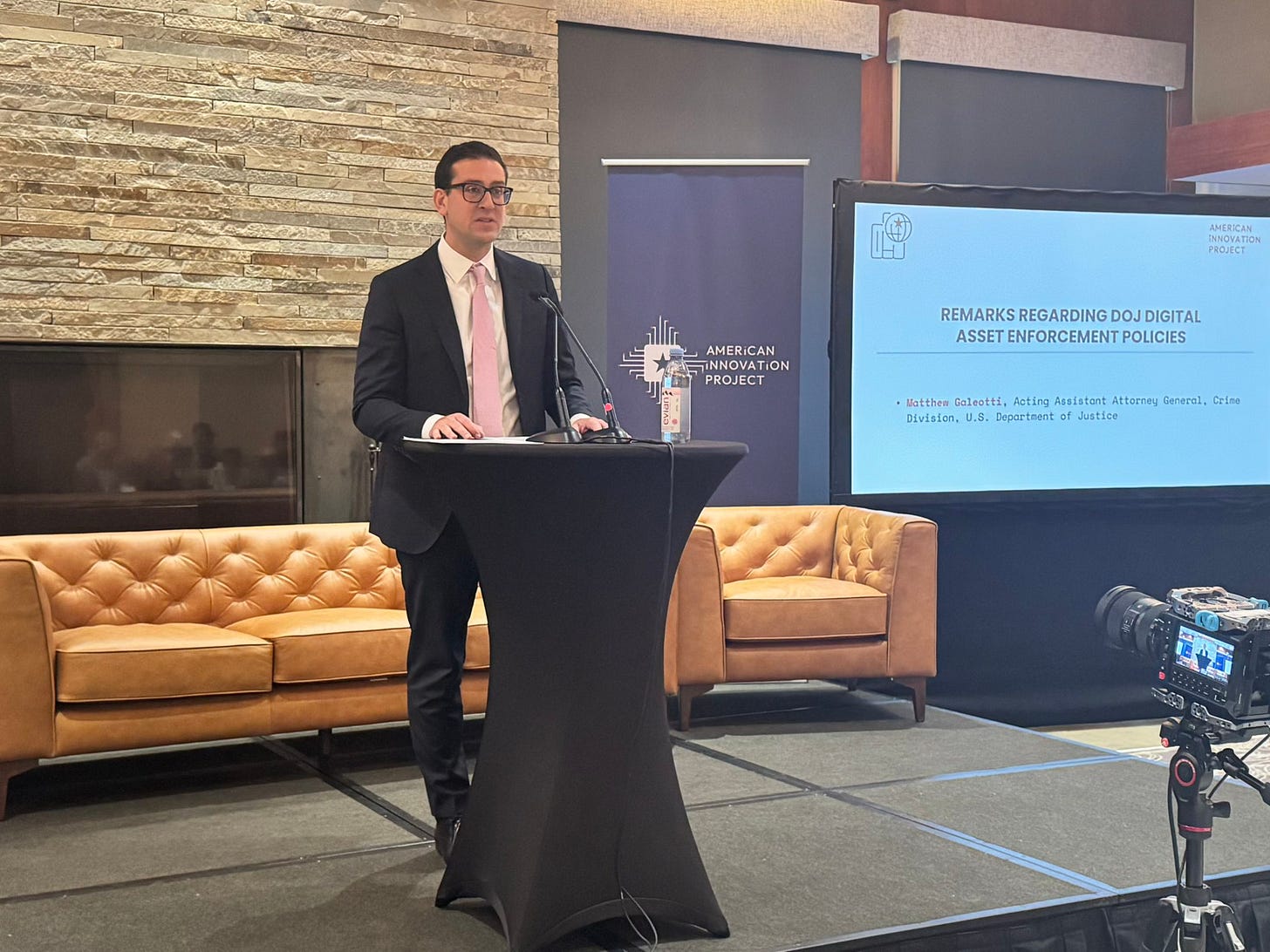DOJ Draws Line in the Sand for Software Developers
Acting Assistant Attorney General says writing code without ill intent is not a crime
Welcome to the Friday edition of the Crypto In America newsletter!
What you’ll read: The DOJ delivers welcome clarity, Congress considers recruiting the private sector to fight hackers, a recap of the Wyoming Blockchain Symposium, and this week’s top stories.
On Thursday, the Justice Department delivered long-awaited clarity to the crypto industry: writing code without ill intent is not a crime.
At the inaugural American Innovation Project (AIP) Summit in Jackson Hole, Matthew Galeotti, Acting Assistant Attorney General in the DOJ’s Criminal Division, told the policy-focused audience that the DOJ will not pursue money-transmission charges under Section 1960 unless there is clear evidence a developer aided and abetted a crime or knowingly violated the law.
Galeotti addressed concerns about recent convictions, including Tornado Cash developer Roman Storm, who was found guilty earlier this month of operating an unlicensed money transmitting business under a specific section of 1960. He emphasized that truly decentralized software that automates peer-to-peer transactions without custody of user assets is not the DOJ’s target.
“Developers of neutral tools with no criminal intent should not be held responsible for someone else’s misuse of these tools. If a third party’s misuse violates criminal law, then that third party should be prosecuted, not the well-intentioned developer,” Galeotti said.
A Game-Changer for Due Process
Amanda Tuminelli, executive director of the DeFi Education Fund, called the remarks a watershed moment.
“The key point is that from this day on, developers can now point to this speech and say the DOJ acknowledged that prior to August 21st, 2025 the law was unclear on what it meant to be operating a money transmitting business.”
Tuminelli said the guidance gives developers stronger due-process and fair notice arguments, key for defending against Section 1960 charges.
Why It Matters for Roman Storm
For developers like Storm facing these charges, the guidance could be pivotal. His case has become a litmus test for how far prosecutors can hold software creators liable for others’ actions.
Tuminelli said Galeotti’s speech could aid Storm as his team navigates a possible appeal.
“There are many ways that Roman’s counsel can use this speech in advocating for him, either to get the 1960 charge dismissed or to make this argument optically to an appellate court.”
From Ships to Cyber: Congress Eyes Digital Privateers
On Capitol Hill, Rep. David Schweikert (R-AZ) wants to bring a centuries-old wartime tool into the digital age.
His Scam Farms Marque and Reprisal Authorization Act of 2025 would let the President issue so-called letters of marque, last used in the War of 1812, which authorized privately owned ships, or privateers, to attack enemy vessels, seize their cargo, and return a share of the spoils to the U.S. government.
Schweikert’s bill would apply the same concept to deputize cyber privateers against foreign hackers and cybercriminals.
The concept was first floated in a February op-ed by former CFTC Chair Chris Giancarlo and Chris Perkins, Managing Partner and President of CoinFund. Perkins highlighted its potential impact, saying:
“I earnestly believe that neo-privateering is the only way to restore security in a way that attracts entrepreneurs back onshore and simultaneously helps to fund the strategic crypto arsenal and bitcoin reserve at no cost to the taxpayer. Thrilled to see a Bill that is finally tackling this issue. It’s time to fight back.”
Schweikert takes it a step further, seeking bipartisan support by framing the bill not only as a national security measure but also as a human rights initiative, citing scam farms in Myanmar and China where trafficked workers run cybercrime operations.
It remains unclear how much support the bill will receive in Congress or from President Trump.
SALT Spotlight
Some of the biggest names in crypto policy descended on Jackson Hole, Wyoming, this week for SALT’s Wyoming Blockchain Symposium, gathering at the Four Seasons over huckleberry lemonade to hash out today’s most pressing issues. Beyond the stunning Tetons backdrop, a few standout moments emerged. Here are the highlights:
Securities and Exchange Commission Chair Paul Atkins:
“From the SEC’s perspective, we will plow forward on this idea that just the token itself is not necessarily the security. There are very few, in my mind, tokens that are securities, but it depends on what’s the package around it and how that’s being sold.”
Federal Reserve Vice Chair for Supervision Michelle Bowman:
Warned that if banks don’t embrace the shift toward crypto, they “will play a diminished role in the financial system more broadly.” She also acknowledged prior debanking practices at the central bank and said the agency “should consider allowing Federal Reserve staff to hold de minimus amounts of crypto or other types of digital assets” so they can achieve an understanding of the underlying functionality.
Federal Reserve Governor Christopher Waller:
“There’s nothing to be afraid of using smart contracts, tokenization, or distributed ledgers in everyday transactions.”
Senate Banking Committee Chair Senator Tim Scott (R-SC):
“I believe that we’ll have between 12 and 18 Democrats at least open to voting for market structure.”
"Thank you, to all of y'all for getting rid of Sherrod Brown.”
Senator Cynthia Lummis (R-WY):
“I'm hoping that before Christmas we'll see market structure in place in the United States.”
Senator Lummis sat down with Crypto in America in Jackson Hole to chat about her journey into crypto, the new Wyoming stablecoin, how much Bitcoin the U.S. holds, and more.
Watch on all platforms here.
Invest as you spend with the Gemini Credit Card®. Get approved to earn $200 in Bitcoin. Issued by WebBank. Terms apply.
Weekly Recap
ICYMI. Here are the biggest news stories this week from the intersection of Washington and Web3:
Tether hired former White House Crypto Council executive director Bo Hines to lead its U.S. strategy.
The seven leading crypto trade groups sent a joint letter to President Trump reaffirming support for Brian Quintenz’s nomination as CFTC Chairman.
Blockchain intelligence company TRM Labs unveiled the Beacon Network, a first-of-its-kind coalition of exchanges, payment firms, researchers, and law enforcement to track and freeze stolen crypto.
CFTC Acting Chairman Pham announced the next crypto sprint initiative to implement the Trump administration's crypto recommendations.
Former Ohio Senator Sherrod Brown’s stance on crypto may be shifting after he told Axios, “My goal is to make sure that as more people use cryptocurrency, it expands opportunity and lifts up Ohioans and they are not put at risk.” Brown lost to Senator Bernie Moreno, who benefited from over $40 million in support from crypto industry-backed super PACs.
Wyoming officially launched the Frontier Stable Token (FRNT), marking the first time a U.S. state has issued its own stablecoin. The token has not yet been made available to the public.
A new nonpartisan nonprofit, the American Innovation Project (AIP), launched Tuesday with backing from Coinbase, Uniswap Labs, and others, aiming to educate U.S. policymakers on issues shaping the future digital economy.
The Winklevoss twins donated 188.45 Bitcoin, worth approximately $21 million, to a new super PAC supporting President Trump's pro-crypto agenda ahead of the 2026 midterm elections.
Coinbase CEO Brian Armstrong predicted Bitcoin will reach $1 million by 2030.
Remember, new editions of the Crypto In America newsletter drop every Monday, Wednesday and Friday at 7AM EST.
If you like what you’re reading, don’t forget to subscribe!








Fun week, in spite of the dip.